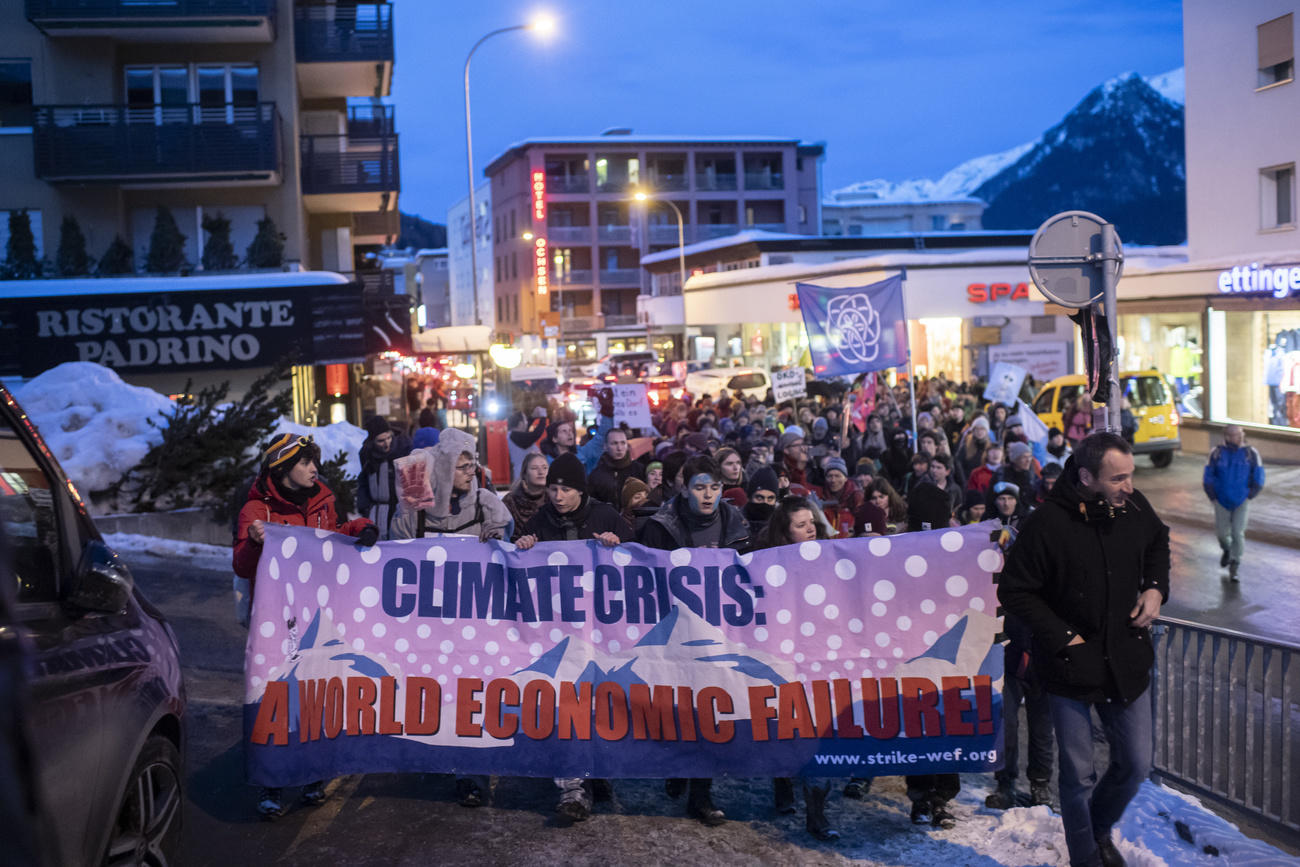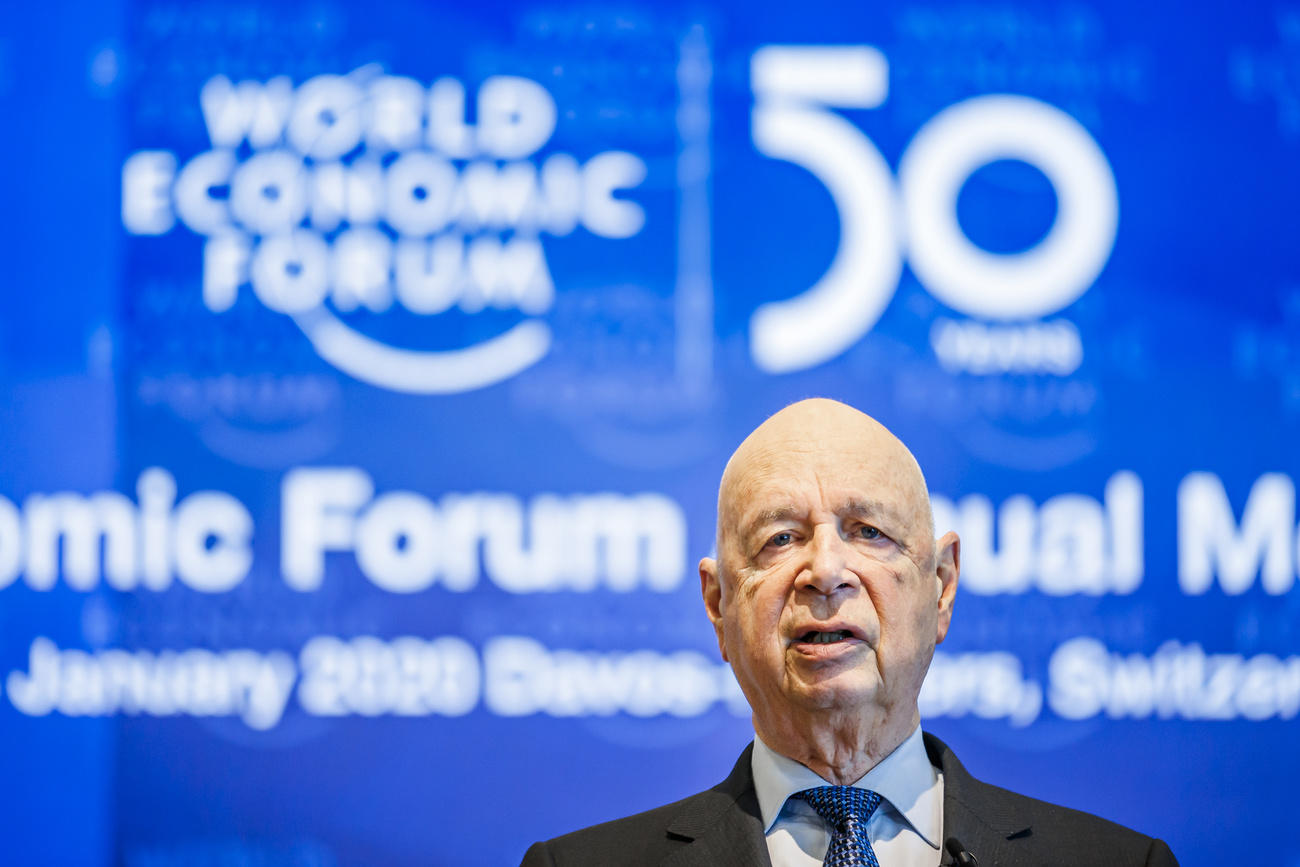
At Davos, climate change dominates discussions

Nearly everyone at Davos spoke about climate change at the annual meeting of the World Economic Forum (WEF), overshadowing other conversations about fears over an economic downturn, populism, increasingly polarized societies and health crises.
There were sessions on “decarbonizing shipping”, “achieving net-zero carbon cities and buildings”, and “how stakeholder capitalism can help heal the planet.” It was clear to anyone who ventured to Davos that the forum’s 50th edition had picked a theme this year.
Speaking on Wednesday, Britain’s Prince CharlesExternal link said it was time for everyone in a leadership role to take action “at revolutionary levels and pace”.

“We are in the midst of a crisis that is now, I hope, well understood. Global warming, climate change, and the devastating loss of biodiversity are the greatest threats that humanity has ever faced and one largely of our own creation,” he said.
“It’s a big step forward that the powerful in Davos have brought the topic to the table,” Sandro Leuenberger of Climate Alliance SwitzerlandExternal link told swissinfo.ch, pointing out that the climate has become an increasingly important topic for WEF in recent years –especially in terms of the financial risks posed by global warming.
In her keynote speech on Wednesday, European Commission President Ursula von der Leyen presented a so-called European Green DealExternal link as a top priority.
“Europe will be the world’s first climate-neutral continent by 2050,” she promised, citing a budget of €1 trillion (CHF1.07 trillion) in investments over the next decade. “European money, national co-financing, private investment, strongly supported by the European Investment Bank, our climate bank. This will create a green investment wave. And there is a demand for it.”
However, she pointed out that there was “no point in only reducing greenhouse gas emissions at home if we increase the import of CO2 from abroad. It is not only a climate issue; it is also an issue of fairness towards our businesses and our workers”.

Saying that she wanted to encourage trading partners to “work with us for a global level playing field”, she commended California for its emission trading system and China for its “first steps” towards a CO2 pricing system.
‘Not very productive’
On the sidelines, the climate crisis also came up during the 11-minute meeting between the leaders of Switzerland and the United States, even though it did not appear to have been a priority of the American side. Simonetta Sommaruga, the Swiss president, broached the subject in her discussions with Donald Trump.
“President Sommaruga mentioned the Paris climate agreement, which was not very productive, because everybody knows where President Trump stands there. That took more time than it should have,” said Edward McMullen, the US ambassador to Switzerland, in an interview with the Aargauer ZeitungExternal link, a Swiss newspaper. “But we were OK with it. She was very honest and passionate, as was President Trump.”

For his part, Trump, speaking in Davos on Tuesday, dismissed “perennial prophets of doom” on climate change.
Sommaruga, who holds the rotating Swiss presidency this year, also heads the environment, transport and energy ministry.
“We support Sommaruga for bringing up the climate with Trump. This is about the survival of humanity,” said Leuenberger of Climate Alliance, which represents 80 groups across Switzerland. “To keep silent would have been irresponsible.”
United Nations Secretary-General António Guterres is also speaking up, saying on Twitter that “while our planet is burning, too many decision makers are fiddling”.
I'm in Davos to deliver a strong message on #ClimateActionExternal link. While our planet is burning, too many decision makers are fiddling. Every city, region, bank, pension fund & industry must completely reimagine how they operate and invest to avoid a point of no return. #WEF20External link
— António Guterres (@antonioguterres) January 23, 2020External link
What now?
Leuenberger, Climate Alliance’s specialist for financial market and climate issues, isn’t sure that the gathering at the luxury ski resort will make a difference.
“The motor is civil society, for example, the climate youth movement,” he said, also citing this month’s acquittal of climate activists who staged a tennis match to protest Credit Suisse’s investments in fossil fuel.
“That ruling was a driver for change. We see that the pressure is working, slowly but surely. And it gives investors cold feet as they begin to see that climate change can cost money,” he says.

More
At 50, WEF sets out to prove there’s a better kind of capitalism

More
Welcome to a ‘woke’ WEF

In compliance with the JTI standards
More: SWI swissinfo.ch certified by the Journalism Trust Initiative





























You can find an overview of ongoing debates with our journalists here . Please join us!
If you want to start a conversation about a topic raised in this article or want to report factual errors, email us at english@swissinfo.ch.